448 Search Results for autism
April 29, 2016
by Carole Zangari -
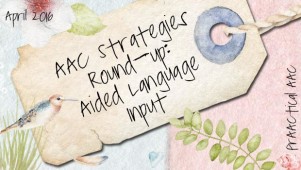
We’ve been writing about aided language input, a pivotal strategy for supporting AAC learners, for several years. In fact, there are over 200 posts tagged with this term. In this post, we gather together some of the most popular posts on this fundamental intervention strategy. Implementation A PrAACtical Idea for Aided Language Input Using Aided Language Input to Build Communication Opportunities! How I Do It: Implementing Aided Language Input with Alicia Garcia Pivotal Skills for AAC Intervention: Aided Language Input How We Do It: Controlled Practice in Partner Augmented Input with Jill Senner & Matthew Baud Text-Based Aided Language: Making the Literacy-Communication Connection for Children with Autism Videos PrAACtical Resources: Video Explainers for Aided Language Input Video of the Week: Aided Language Input with Gail Van Tatenhove Video of the Week: Aided Language Input with Dr. Caroline Musselwhite PrAACtical Resources: Video Examples of Aided Language Input Aided Language Input in... [Read More...]
April 18, 2016
by Carole Zangari -
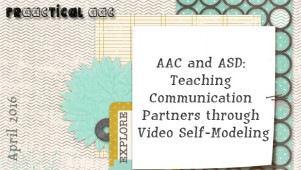
It is an honor to have Dr. Joanne Cafiero, an AAC consultant for individuals with complex communication needs and Autism Spectrum Disorders, as a guest contributor for today’s post. Dr. Cafiero is the author of Meaningful Exchanges for People with Autism an Introduction to AAC (2005). She is a consulting editor for Focus on Autism and Other Developmental Disabilities and has guest edited several of ASHA’s Perspectives in AAC. She was a member of the National Academy of Sciences Committee on Educational Interventions for Children with Autism (2001) and is currently working on an update on AAC and Autism for the Academy. In this post, she shares some of her work on video self-modeling. ::::::::::::::::::::::::::::::::::::::::::::::::: Growing research and first-person reports are illuminating the unique sensory and motor differences experienced by people on the Autism Spectrum. This new information has a huge impact on the AAC practitioner. Motor planning differences in ASD can... [Read More...]
April 17, 2016
by Carole Zangari -
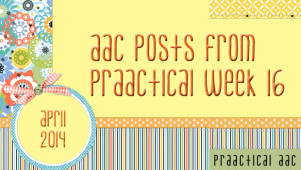
AAC posts you may have missed in your busy week. Monday – PrAACtical Resources: Video Examples of Aided Language Input Wednesday – Visual Immersion Program Thursday – How We Do It: Controlled Practice with Partner Augmented Input
April 13, 2016
by Carole Zangari -

April is a great month to expand our understanding of how to support individuals with autism. In this week’s featured video, we learn about the Visual Immersion Program from Dr. Howard Shane, James Sorce, and Meghan O’Brien. Many thanks to the AAC-RERC for making this available.
April 10, 2016
by Carole Zangari -
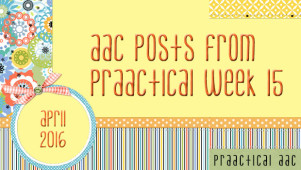
Had a busy week? Here are a few posts that you may have missed. Monday – PrAACtical Teaching in an ASD Classroom: Little Tips for Big Core Wednesday – Video of the Week: AAC at Home Thursday – Beyond Autism Awareness to Acceptance, Understanding and Inclusion
April 3, 2016
by Carole Zangari -
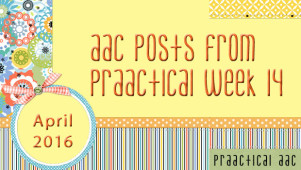
Hope you had a great start to Autism Awareness and Acceptance Month! Monday – PrAACtical Resources: Video Explainers for Aided Language Input Wednesday – Video of the Week: Getting Started with PODD Friday – PrAACtically April: Resources for a Year of Core Vocabulary Words
February 25, 2016
by Carole Zangari -
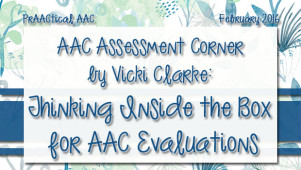
AAC assessment is a challenge in almost every service delivery setting, and many of you have reached out to us to ask for advice on how to strengthen your assessment practices. Luckily, Vicki Clarke, an AAC Chick who has a great deal of experience assessing learners in clinical and educational settings, has tips and resources to share. In this continuation of the AAC Assessment Corner series, Vicki talks about a key feature in any AAC system: vocabulary organization. ::::::::::::::::::::::::::::::::::::::::::::::::::::::::::::::::::::::::::::::::::::::::::::: Thinking Inside the Box for AAC Evaluations: What Type of Vocabulary Organization is Right For Your AAC User? Professionals often spend a great deal of time concerning themselves with which box they should get their AAC user. Should I pick a Prentke Romich or a Tobii Dynavox? But what about the iPad? And what about the money? Should I pick a CheapTalk or a GoTalk instead? Here’s the good news: The box is not the... [Read More...]
February 8, 2016
by Carole Zangari -
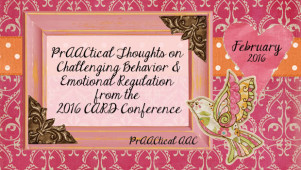
Last month, I had an opportunity to hear Dr. Barry Prizant, Director of Childhood Communication Services and Adjunct Professor at Brown University, at the 2016 Center for Autism and Related Disabilities Conference. Many of you know Dr. Prizant as co-author of SCERTS, the Social Communication Emotional Regulation Transactional Supports Program, and his recent book, Uniquely Human, discussed in this video. At this conference, he spoke on ‘An Emotional Regulation Approach to Preventing Problem Behavior.’ Here are some points of interest from his presentation. Dr. Prizant suggested that when someone is dysregulated, the first thing we should think about is biological factors that may be causing or exacerbating the problem. Why? Because unless we address the root of the problem, chances are slim that any behavioral, communicative, or psychological strategies will be effective in the long run. In some cases, there is a rather straightforward solution, such as teaching our client... [Read More...]
February 2, 2016
by Carole Zangari -

I had a wonderful time this past weekend connecting with colleagues and learning from ASD experts at the 2016 Center for Autism and Related Disabilities (CARD) Conference in Orlando. One of the keynotes, “From Building Social Relationships to Improved Quality of Life Outcomes for Youth on the Autism Spectrum: We Finally Know What We Already Knew,” was given by Dr. Scott Bellini. I also attended his talk on the Building Social Relationships program. Here are some of the take-aways from those two sessions. Evidence Base The evidence base for social skills training is variable. While his meta-analysis on school-based social skills training found that social skills interventions were minimally effective, there are several effective strategies that can be used in that and other settings. When evidence-based strategies, including video modeling and video self-modeling and social narratives, are used within the context of social skills training, the overall efficacy is much greater. The evidence... [Read More...]
January 11, 2016
by Carole Zangari -
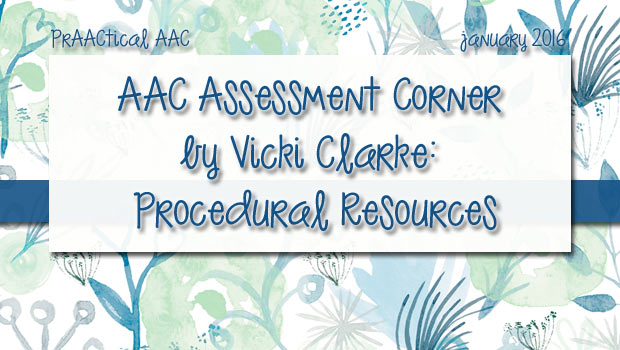
The new year is bringing some changes to PrAACtical AAC, and one that I am most excited about is a regular monthly article by SLP Vicki Clarke. Vicki is a phenomenal clinician with a private practice in Georgia who has been specializing in AAC since 1991. Her practice, Dynamic Therapy Associates, averages around 50 AAC evaluations a year, so she was the perfect choice to write about AAC assessment practices. Vicki’s assessments are for both for individuals and school districts, and include clients of all ages (peds through adults) who have a variety of challenges and etiologies (e.g., motor disorders, memory, attention and learning difficulties, sensory impairment, neurological differences, syndromes and seizure disorders, congenital and acquired difficulties). Click on these links to learn more about Vicki’s life as an AAC therapist and the kinds of supports provided at Dynamic Therapy Associates. I know you will appreciate the resources, ideas, and tips that Vicki... [Read More...]









